GDPR: Complete guide to GDPR compliance for marketers

As digital marketing evolves, respecting privacy and data protection has become increasingly important. The EU's General Data Protection Regulation (GDPR) protects individuals' privacy and personal data, significantly affecting how businesses handle customer information.
How has GDPR affected marketing? It has significantly impacted how companies collect, store, and use customer data, especially in terms of obtaining consent and protecting privacy. Due to GDPR, 52% of consumers feel they have greater control over their data and its usage (CISCO CYBERSECURITY SERIES 2019 • DATA PRIVACY November 2019).
For marketers, GDPR is not just about following legal protocols—it's about building trust and ensuring transparency in how customer data is collected, processed, and used. Failure to comply can lead to hefty fines and damage to a brand's reputation.
This guide will explain the essential elements of GDPR that marketers need to know, offering actionable tips for compliance and safeguarding customer data.
What is GDPR?
The GDPR is a legal framework the EU has established to safeguard the personal data of EU citizens. It applies to all companies, organizations, or entities—whether based in the EU or outside—that handle, process, or store the personal data of individuals located in the EU.
GDPR took effect on May 25, 2018, to give individuals more control over their personal data. The regulation enforces stricter rules on how businesses collect, store, and share personal information, making it imperative for companies to adopt robust data protection practices.
Key aspects of GDPR include:
- Data protection by design and default: Businesses must integrate privacy measures into their operations and systems from the start rather than as an afterthought.
- Stronger consent requirements: Businesses must obtain explicit, informed consent from individuals to process their data.
- Transparency: Companies must inform individuals about how their data will be used, who will have access to it, and for how long it will be stored.
- Data subject rights: Individuals have the right to access, rectify, and delete their data and the right to data portability.
Understanding and adhering to GDPR isn't optional—it's a legal requirement for businesses that interact with EU citizens.
For marketers, this means reevaluating how customer data is gathered, processed, and used across GDPR marketing activities.
Also read: Data privacy regulation terminology: GDPR, CCPA, and more
Why GDPR matters for marketers
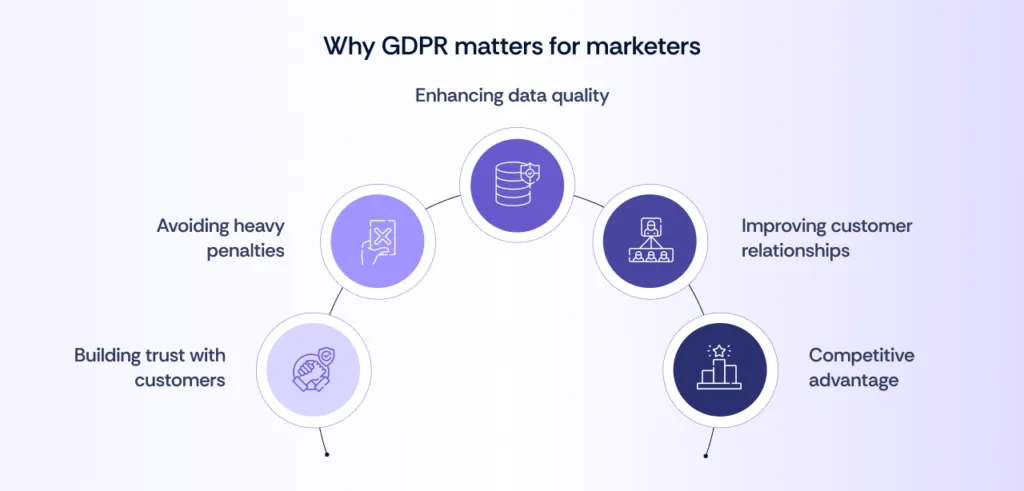
How has GDPR affected marketing? GDPR profoundly impacts marketing practices, especially given the reliance on personal data to create targeted, personalized customer experiences.
As digital marketing becomes more personalized, GDPR digital marketing ensures that businesses use consumer data in compliance with privacy regulations.
As marketers, the way we collect, store, and use consumer data has to change to comply with GDPR, but there are significant benefits that come with these changes:
Building trust with customers
GDPR emphasizes transparency and accountability in handling customer data. By adhering to these regulations, marketers can build greater trust with their audiences.
Today, customers are increasingly aware of their data privacy rights and prefer to engage with businesses that prioritize protecting their personal information.
Ensuring GDPR compliance shows customers you respect their privacy and are committed to safeguarding their data.
Avoiding heavy penalties
One of the most critical aspects of GDPR is its stringent enforcement.
Non-compliance can result in significant fines—up to 4% of a company's global annual turnover or €20 million (whichever is higher).
Failing to implement proper data protection measures can lead to costly financial penalties, which could severely impact your business.
Enhancing data quality
GDPR encourages marketers to only collect and store data that is necessary for specific purposes. This leads to better-quality data that is more likely to be relevant, up-to-date, and used responsibly. By focusing on gathering only the most pertinent data, you improve the accuracy of your marketing campaigns and enhance customer engagement.
Improving customer relationships
When customers feel confident that their data is being handled responsibly, they are more likely to engage with your brand and remain loyal. Marketers who prioritize customer data privacy are viewed as more ethical and trustworthy. This helps nurture long-term relationships with customers, ultimately contributing to brand loyalty and customer retention.
Competitive advantage
Compliance with GDPR not only protects your business but can also serve as a differentiator in the market. Businesses that prioritize compliance can use it as a selling point, attracting customers who value privacy and security. It also demonstrates that your brand is forward-thinking and willing to adapt to changing regulations.
GDPR matters because it reshapes how marketers approach data protection and customer privacy. It may involve initial changes to business operations, but the long-term benefits—such as building trust, avoiding fines, and enhancing customer loyalty—are well worth the effort.
Also read: GDPR compliance 101
Key GDPR principles every marketer should know
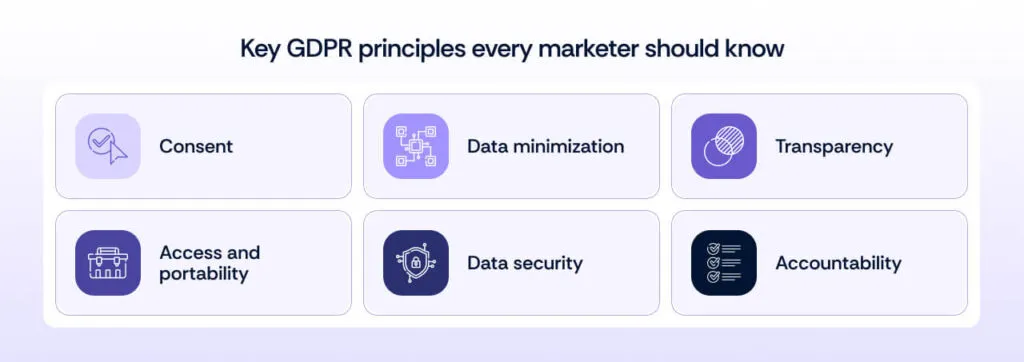
To ensure GDPR compliance, marketers must adhere to several key principles that govern how personal data is collected, processed, and used. These principles are designed to protect individuals' privacy and ensure that businesses handle data responsibly.
Consent
GDPR marketing requires businesses to obtain clear and informed consent from consumers before using their data for targeted advertising. One of the core principles of GDPR is obtaining explicit consent from individuals before collecting or processing their personal data.
GDPR marketing consent means customers must actively opt-in, rather than being pre-selected or automatically enrolled. GDPR marketing consent entails the use of clear, understandable consent forms and individuals should know exactly what their data will be used for.
For example, when building email lists or gathering data for targeted campaigns, ensure customers have willingly agreed to it, without ambiguity.
Data minimization
Data minimization means collecting only the data necessary for the specific purpose at hand. Instead of collecting broad, unnecessary information, marketers should focus on gathering just what's needed for a campaign or service.
For instance, if you're running a promotion, only request data relevant to the offer, such as name and email, instead of unnecessary details like address or phone number.
Transparency
Transparency is key to building trust with your customers. Marketers must clearly communicate how customer data will be used, who will access it, and for how long it will be stored. This is often done through a privacy notice or privacy policy that should be easy for customers to understand. Additionally, transparency includes informing users of their rights, such as the right to withdraw consent at any time.
Access and portability
GDPR gives individuals the right to access their personal data and request it in a usable format. This means customers can view the data you've collected about them.
Further, they have the right to data portability, which allows them to request that their data be transferred to another service provider if they choose.
As a marketer, you need systems in place to fulfill these requests within the stipulated 30-day period.
Data security
Marketers must take the necessary steps to ensure that customer data is secure. This involves implementing appropriate technical measures, such as encryption, access controls, and regular security audits. Protecting data from unauthorized access or breaches is crucial to maintaining compliance and customer trust.
Accountability
Accountability means that businesses must be able to demonstrate compliance with GDPR. This includes:
- Documenting data processing activities
- Maintaining records of consent
- Implementing privacy policies
Marketers should regularly audit their data practices to ensure they meet GDPR standards and be ready to show regulators proof of compliance if necessary.
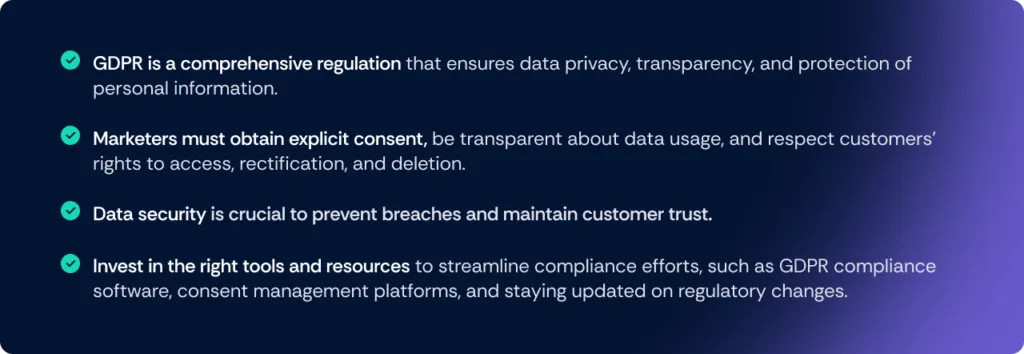
Also read: How GDPR affects marketing
How GDPR affects marketing activities
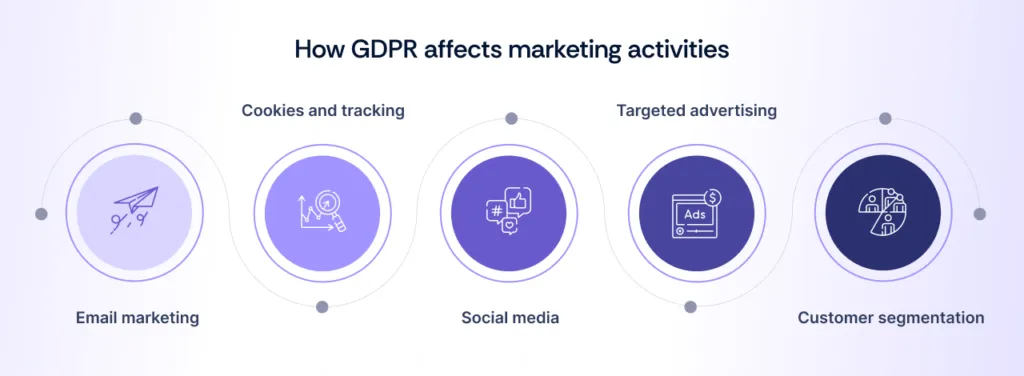
GDPR significantly impacts the way marketers conduct campaigns and manage customer data.
Here's how it affects common digital marketing activities:
GDPR email marketing
Under GDPR, marketers must obtain clear consent before adding customers to email marketing lists. This means customers need to opt in rather than having their email addresses automatically collected.
Companies must ensure that their GDPR email marketing practices include obtaining explicit consent before sending promotional emails to subscribers. Additionally, each marketing email must contain an easy way for recipients to opt out (unsubscribe) at any time. Maintaining consent records is essential to ensure compliance and avoid fines.

Cookies and tracking
GDPR online marketing practices require marketers to inform users about the type of data being collected and obtain consent before placing cookies on their devices.
Websites must display clear cookie banners or consent forms, explain how cookies are used, and offer users an option to opt out if they prefer. This includes tracking data for analytics, ads, and retargeting.
Social media
Managing social media data under GDPR means ensuring that any personal data collected through platforms like Facebook, Instagram, or LinkedIn is compliant.
If you run ads or promotions on social media that collect customer information, you must obtain consent and respect individuals' privacy rights.
Additionally, ensure that any data shared with third-party tools or partners complies with GDPR's data protection standards.
Targeted advertising
GDPR places limitations on how marketers use customer data for targeted ads.
- Consent must be obtained before using personal data for profiling or personalized advertising.
- Marketers should be transparent about what data is being collected for targeting, whether it's based on browsing behavior or demographic information.
- Individuals should also be able to easily opt out of being targeted with personalized ads.
Customer segmentation
Customer segmentation under GDPR requires marketers to carefully consider how they gather and categorize data.
- Only necessary data should be collected for segmentation purposes.
- Personal data should not be processed in ways that could harm individuals or violate their privacy.
- Marketers must also ensure that segmented customer lists are securely stored and easily accessible for customers to delete or modify upon request.
Also read: GDPR cookie consent requirements and how to comply
Steps to ensure GDPR compliance in marketing
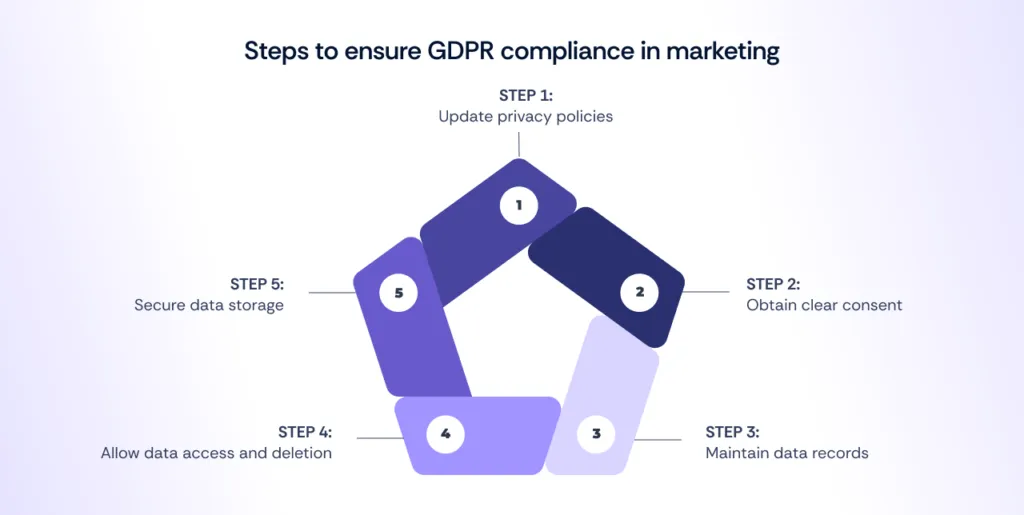
GDPR compliance marketing involves implementing data protection measures, such as secure data storage and clear consent management, to avoid violations and ensure customer privacy.
To avoid penalties and build trust with customers, marketers must take actionable steps to ensure GDPR compliance in their operations.
Here are essential steps for staying compliant:
Step 1: Update privacy policies
Ensure your privacy policy clearly outlines how customer data is collected, processed, and stored.
The policy must be easily accessible to users and updated regularly to reflect any changes in data processing practices.
It should also include information on customer rights, such as the right to access or delete their data.
Step 2: Obtain clear consent
Always obtain explicit consent from customers before collecting or processing their data. Whether it's for email marketing or customer surveys, customers must understand what they are agreeing to. This can be done through clear, concise consent forms or checkboxes, with no pre-checked options. Ensure that consent is documented for future reference.
Step 3: Maintain data records
It's essential to keep records of all data collection activities. This includes tracking when and how consent was obtained, what data was collected, and how it will be used.
Maintaining a central record of consent and data processing activities will help demonstrate compliance during audits or inspections by data protection authorities.
Step 4: Allow data access and deletion
Customers have the right to access their personal data and request its deletion.
Ensure that your system is capable of handling these requests quickly and efficiently.
Provide customers with easy methods to access, correct, or delete their data, and process these requests within the GDPR-mandated 30-day time frame.
Step 5: Secure data storage
Implement security measures to protect the data you collect. This includes encrypting sensitive customer data, restricting access to authorized personnel only, and regularly auditing your data protection practices. Data breaches can lead to severe fines, so it's critical to implement robust security measures to prevent unauthorized access to personal data.
Also read: Does your business need to comply with GDPR
Common GDPR mistakes marketers make and how to avoid them
Even experienced marketers may stumble when it comes to complying with GDPR.
Here are some common mistakes and tips on how to avoid them:
1. Lack of proper consent management
One of the most frequent mistakes is not managing consent correctly. This includes failing to obtain clear, explicit consent or not properly documenting the consent.
To avoid this, marketers should:
- Implement a clear consent management system, using opt-in checkboxes and transparent language to explain why data is being collected and how it will be used.
- Always keep records of consent to prove compliance.
2. Not being transparent with customers
Transparency is a key principle of GDPR. Marketers sometimes fail to fully explain to customers what data is being collected, why it's collected, and who will have access to it.
To avoid this:
- Ensure that your privacy policy and data collection forms are clear and easily accessible.
- Transparency builds trust, so make sure customers know their rights and how their data will be used.
3. Ignoring customer rights (access, rectification, deletion)
Another mistake is not respecting customers' rights under GDPR, particularly the rights to access, rectification, and deletion. Marketers may inadvertently ignore requests for customers to view, correct, or erase their data.
To avoid this:
- Set up systems to respond to these requests promptly (within 30 days).
- Make sure your customers can easily access and manage their data.
4. Failing to secure data appropriately
Failing to protect customer data is a critical mistake that can lead to costly breaches. Marketers sometimes overlook the importance of encryption, secure storage, and access control.
To prevent this:
- Ensure you implement adequate security measures, such as encryption and multi-factor authentication (MFA)
- Conduct regular security audits.
Also read: Best practices for automating GDPR compliance
Wrapping up
In conclusion, GDPR compliance is not just a legal requirement but also an opportunity for marketers to build stronger, more trustworthy relationships with customers.
Regularly audit your marketing practices, update privacy policies, and ensure that your team understands and follows GDPR guidelines.
Scrut helps companies stay on top of their GDPR compliance efforts by providing an easy-to-use platform for data management, security, and reporting. Get in touch with Scrut today and ensure your marketing practices are compliant with GDPR.
FAQs
1. What is GDPR and why is it important for marketers? GDPR (General Data Protection Regulation) is a regulation that governs data protection and privacy in the European Union. It is important for marketers because it sets strict rules for handling customer data, ensuring privacy and transparency, which helps build trust and avoid penalties.
2. How can marketers ensure GDPR compliance? Marketers can ensure GDPR compliance by obtaining explicit consent for data collection, being transparent about how customer data will be used, implementing secure data storage practices, and respecting customer rights to access, correct, or delete their data.
3. What are the key principles of GDPR every marketer should follow? The key principles include consent (obtaining clear permission), data minimization (only collecting necessary data), transparency (being open about data usage), security (protecting customer data), and accountability (demonstrating compliance).
4. How does GDPR impact email marketing campaigns? GDPR requires marketers to get clear consent from users before sending marketing emails. You must provide an easy way for recipients to opt-in and opt-out, and ensure their data is protected in accordance with the regulation.
5. What tools can marketers use to manage GDPR compliance? Tools like GDPR compliance software (OneTrust, TrustArc), Data Management Platforms (Tealium, Segment), and privacy policy generators help marketers manage consent, track data, and ensure compliance with GDPR regulations.


















